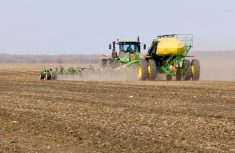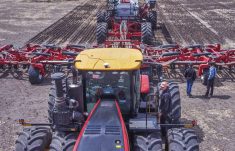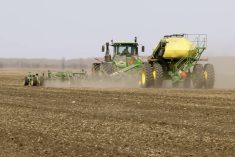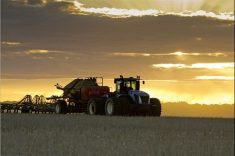Should farmers expect delays to fertilizer deliveries heading into spring seeding?
“Not if we can help it,” Fertilizer Canada CEO Garth Whyte said Thursday.”We’ve weathered all the rail system disruptions that we had over the last six months, and now, with COVID-19, we’re doing OK.
“We’ve put contingency plans in at our manufacturing plants, at our storage terminals, and our retail outlets across the country to make sure that employees are protected and that farmers get the fertilizer they need.
“Stocks are pretty well in position, and once farmers start up in a couple weeks, we should be OK.”
Read Also

Dryness poised to threaten Saskatchewan crops
Crops in Saskatchewan are developing in opposite directions, the province’s latest crop report said. Growing conditions in the province vary, with some areas receiving enough rain while other locations are experiencing crop stress due to hot, dry conditions.
Fertilizer Canada is working closely with provincial and federal governments, as well as national ag organizations, to ensure COVID-19 safety measures don’t have “unintended consequences” on fertilizer distribution.
“We’ve implored government to not forget about us,” Whyte said. “We’ve really been pushing that fertilizer is an essential commodity that’s got to get to our farmers.”
“A lot of the directions around COVID-19 have been from an urban point of view, but we’re there to remind them that we need to make sure that we don’t blindside the agriculture industry with any changes.”
The federal government announced Wednesday that trade between Canada and the U.S. would remain mostly uninterrupted despite closing the border to non-essential traffic.
But the real concern right now is potential trucker shortages across North America, Whyte said, adding that trucking regulations may need to change to reflect the current emergency situation.
“They may have to work longer hours, so they shouldn’t be impeded by hours-of-work legislation,” he said. “It’s got to be safe and secure, of course, but if it is, then let’s make sure we’re doing everything possible to get fertilizer to the growers when they need it.”
While the Canadian Trucking Alliance isn’t yet experiencing problems, Fertilizer Canada will be monitoring the situation.
“We’re ramped up, but (seeding) is not going to happen for a couple more weeks, so we’re monitoring and preparing now.”
So far, the response from governments has been “overwhelmingly supportive,” he added.
“They basically understand the importance of agriculture and agribusiness and their inputs as a major part of their COVID-19 contingency planning,” said Whyte.
“It’s critical that we have a successful planting season this spring that hopefully leads to good yields at harvest this fall. If we have a strong agriculture sector, it can play a major role in Canada’s economy, especially with everything going on.
“As we try to get out of this pandemic and potential recession, one of the shining lights will hopefully be agriculture.”
— Jennifer Blair reports for Alberta Farmer from Red Deer.














